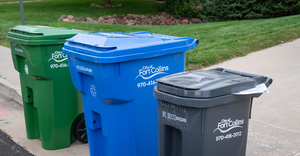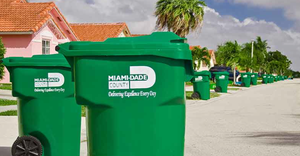15 States Push to Enshrine Right to a Healthy Environment Into Law
Lately, 15 more states have proposed, or are working on, similar proposals. California is among the most recent of them to take a leap forward; its green amendment should wind up on the ballot for the 2024 general election if it passes both houses. Maya van Rossum, founder of nonprofit Green Amendments For the Generations, launched the movement after winning that legal action years ago in her role at the Delaware Riverkeeper Network.

About 10 years ago, a Pennsylvania lawyer filed a landmark lawsuit that ultimately led to the start of what’s now known as a “Green Amendments” movement. It aims to ensure environmental rights the same Constitutional protections as freedom of speech and other fundamental rights. That first green amendment was a huge first step, though it’s still just one of three today—joined only by similar laws in Montana and New York—but the slow-turning wheels are starting to spin a little faster.
Lately, 15 more states have proposed, or are working on, similar proposals. California is among the most recent of them to take a leap forward; its green amendment should wind up on the ballot for the 2024 general election if it passes both houses.
Maya van Rossum, founder of nonprofit Green Amendments For the Generations, launched the movement after winning that legal action years ago in her role at the Delaware Riverkeeper Network. Working with several municipalities, she was challenging a Pennsylvania law that gave the fossil fuel industry automatic waivers from some environmental protection standards, allowed oil and gas well pads to operate in residential communities, and sanctioned other practices that van Rossum maintained did not protect the environment or people.
“We thought the law was so egregious that maybe we were in a moment in time where we could get the Pennsylvania Supreme Court to reconsider the Constitutional language and recognize environmental rights should have as much power as other fundamental rights,” she says.
van Rossum argued that the law violated environmental rights written into the Constitution decades before. The catch is that the courts and government could disregard them because the language was considered a policy statement, boiling down to no more than advice rather than enforceable mandates.
But the green amendment that came to be, inspired by the Pennsylvania lawsuit, sits in the declaration of rights section of the state Constitution, placing it on par with all other fundamental freedoms. And this placement brings with it certain legal protections.
“My aim was to get this kind of [legislation] in every state Constitution and ultimately in the federal Constitution. So, I looked at the language in the Pennsylvania amendment to determine what made it so strong that it could be used to defeat a law passed by the state legislature and signed by the governor,” van Rossum says.
The Pennsylvania amendment has two main components, explicitly stipulating 1)people have the right to environmental essentials, including pure water and clean air; and 2)the state’s government officials are obligated to serve as trustee, protecting natural resources for the people of Pennsylvania, who are designated as the trust beneficiaries.
“At the time we had a conservative chief justice who you might assume would rule against us. But this justice and the court saw the language and that it was in the declaration of rights. They decided that the environmental rights and the duties written into the language should have the same strength [as laws to protect long-recognized fundamental rights],” van Rossum says.
New Mexico's economy relies heavily on revenue from oil and gas and other carbon-intensive industries, but there are ramifications. New Mexico Senator Harold Pope Jr., a co-sponsor of a green amendment bill in that state, calls out “Superfund-level pollution” and other contamination impacting the state's land and agricultural sector, as well as its drinking water.
“New Mexico has been used as a sacrificial zone for decades whether it be uranium mining, nuclear waste, oil and natural gas … you name it. This is why it is so important the people of New Mexico have these Constitutional protections,” he says.
The amendment has made its way into the legislature for the second time; re-introduced into the state Senate this past session. But it was tabled before going to vote. Pope and his co-sponsors plan to bring it back for the 2025 session.
“We have built a large coalition of voters and groups made up of our youth and seniors, urban and rural, as well as our Indigenous communities. The people want this protection.”
But the fossil industry is strongly opposed.
“They see this as a threat to their business practices, but the reality is that we are just holding them accountable. If industry does right by the community, they should have no cause for concern.”
Rikki Seguin, executive director of Interwest Energy Alliance, representing developers and manufacturers of large-scale renewable energy, has been vocal against green amendments, quoted in the Carlsbad Current-Argus as saying a green amendment could lead to lawsuits during the permitting process, and that the "actual language of the bill will make it more difficult for us to build clean energy projects in [New Mexico]."
Ultimately, say industry stakeholders she represents, these laws could keep states from meeting their renewable goals. Proponents refer to their arguments as a red herring.
Seguin did not return calls or respond to emails from Waste360.
In California, assemblymember Isaac Bryan who proposed a similar amendment believes the legislation could help California work toward its climate goals and afford environmental protections at a time when federal policy is in question, as reported by Bloomberg.
In Texas, Representative Victoria Goodwin authored the Stewardship Amendment, which is that state’s version of the green amendment.
The bill was brought to the legislature but has not received a hearing. Goodwin plans to file it again in January 2025 – the next opportunity to do so –Texas has a biennial legislature that meets in odd-numbered years.
In the meantime, she and other advocates are working to build a statewide coalition to help push for a hearing and the bill’s passage.
“My constituents are excited about our efforts. And while we have not sought feedback from the oil and gas industry at this time, there are ranchers who own land that is leased by oil and gas extraction companies, and they have generally been supportive,” she says.
Proponents tell renewable energy developers, concerned these laws could stymie their projects, that this won’t happen.
van Rossum and other backers argue that they can actually prevent early projects from falling down and also prevent frivolous lawsuits—another stated concern.
van Rossum points to a scenario in Pennsylvania where the amendment served as a foundation to establish drinking water protections from PFAS “avoiding litigation by making the right decision first.”
“In general, if green amendments are properly interpreted and applied, we avoid litigation because government officials are doing a better job from the start,” she says.
The American Bar Association has stated that green amendments "will create some additional litigation, uncertainty, and burden on business and industry. But the trade group goes on to acknowledge, “They are being enacted precisely to address the uncertainty and burden that currently falls on the people due to risks from unregulated exposures."
Pushing Constitutional amendments of any kind through tends to be harder than getting a law passed. But they have more far-reaching protections, as laws can be rolled back when the political tide turns, van Rossum notes.
“Once you get those protections in a state Constitution, it is unlikely they will ever be lost. And that’s really powerful.”
About the Author
You May Also Like




